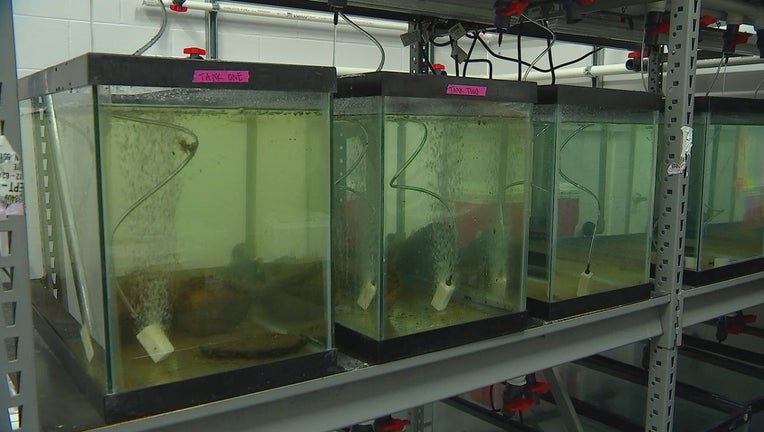University of Minnesota works on gene-editing techniques to stop zebra mussels

University of Minnesota researchers are working on ways to stop invasive species. (FOX 9)
(FOX 9) - At the Minnesota Aquatic Invasive Species Research Center located on the University of Minnesota's St Paul Campus, director Nick Phelps is making progress developing genetic control strategies aimed at killing off zebra mussels once and for all.
"We can essentially snip out the gene that attaches to the rock. If it doesn’t attach it falls to the bottom and dies," he explained. "Never been done in an aquatic setting like this, breaking ground here."

University of Minnesota works on gene-editing techniques to stop zebra mussels
At the Minnesota Aquatic Invasive Species Research Center located on the University of Minnesota's St Paul Campus, director Nick Phelps is making progress developing genetic control strategies aimed at killing off zebra mussels once and for all.
While that DNA research continues the lab has launched a website based on separate research, aimed at slowing the spread of all invasive species across the state.
AIS Explorer complies more than a million and a half answers to the most common questions boaters are asked by inspectors at launches across the state: Where’s your boat coming from? And where's it headed? That data now predicting which of the 10,000 lakes may be at the highest risk of being infested by an invasive species hitching a ride.
"We have far too many lakes for the resources we have at our disposal this is a big problem," says Phelps. "Trying to guess where they are going to go we have learned has not been 100 percent effective, so we are hoping a tool like this can help make better decisions, evidence-based decisions."
Wright County Water Management Specialist Alica O’Hara started using the interactive site a year ago as a tool for summer planning. "Where should we put the inspectors and how long for? We only have so many hours and we put the inspectors there because we only have so much money."
Now any curious boater can log on to the AIS Explorer while Phelps continues his quest to rid the beloved lakes of invasive species for good. "Personally and professionally, I’d like to get rid of them."

